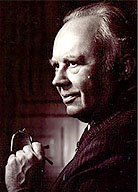What we need for victory in 2014 and beyond: Part II
 The first three principles of conservatism given by Russell Kirk are belief in an enduring moral order, adherence to custom, convention, and continuity, and belief in what may be called the principle of prescription—that is, of things established by immemorial usage. Readers will recognize how the argument developed here applies to same sex marriage and other threats to tradition. These first three principles may sound stifling, but I will demonstrate how adherence to these principles is the only way self-government can be maintained and liberty protected.
The first three principles of conservatism given by Russell Kirk are belief in an enduring moral order, adherence to custom, convention, and continuity, and belief in what may be called the principle of prescription—that is, of things established by immemorial usage. Readers will recognize how the argument developed here applies to same sex marriage and other threats to tradition. These first three principles may sound stifling, but I will demonstrate how adherence to these principles is the only way self-government can be maintained and liberty protected.
Liberty under God and Law, as Tocqueville formulated it, is distinct from the liberty argued for by those who favor radical democracy. As we move closer toward a radically democratic regime, we also move toward a system in which the will of the individual is glorified and fewer restraints are placed around human desires. Responsible liberty, dignified liberty, is sacrificed when pure democracy is pursued because pure democracy does not recognize an enduring moral order; it only recognizes the will of the majority. But self-government is sustainable only when man operates within traditional limits.
Daniel J. Mahoney writes, “unencumbered choice can never be the sole-criterion for judging the thought and action of human beings. Liberty understood as pure freedom unconnected to larger ends and purposes fatally undermines the dialectics of truth and liberty, and liberty and virtue, that define true human existence.” This touches upon a truth about the human condition, which is that man is an ever-wandering, searching being who can never be satisfied by looking within himself. Man is incomplete and cannot complete himself or his longings by staying within himself. Man must reconcile himself to his limited capacity and recognize that there is an enduring moral order he must submit to as well as the fact that those who have come before him can offer guidance.
It is undignified to undermine traditional structures for doing so separates man from what he needs to attain his dignity. Per Aristotle, man can only reach his telos within a community whose traditional order he acts according to. To be happy and complete—not to mention moral—man must act within traditional boundaries so long as those boundaries reflect an enduring moral order. All people—to a greater or lesser degree—are like children testing their boundaries. Responsible parents realize they must set boundaries for their children otherwise they risk having a child who has no direction, sense of self or natural restraint. The same is true of a citizen who seeks to unhinge himself from the traditional order. A person with no limits will be nihilistic, disenchanted, and doomed to failure.
Progressives encourage a “radical emancipation from natural limits and moral restraints and from a transcendent order above the will of men.” However, if man dislodges himself from what he needs, from what is natural, he will fail to achieve fulfillment, happiness, and dignity.
I agree with Tocqueville’s assessment that collectivism originates in radical individualism. Because men need limits, and radical individualism rejects all natural limits and thereby destroys human connections, the end result of radical individualism—and thus radical democracy—is a dependence upon an impersonal ‘schoolmaster.’ Radical individualism will destroy traditional values and in turn force people to turn toward the government for fulfillment, safety and guidance. The process from radical individualism to collectivism will enervate the human soul and destroy the capacity for individual initiative and moral and civic judgment. Obedience to an enduring moral order, adherence to custom, convention, and continuity, and belief in things established immemorial usage is required for liberty and self-government. Man is in need of limits. Without natural limits, democratic government is nothing more than a relativistic anarchy cloaked in the misappropriated rhetoric of liberty and equality.




Comments
Join the Discussion on Facebook
Join the discussion on Facebook.